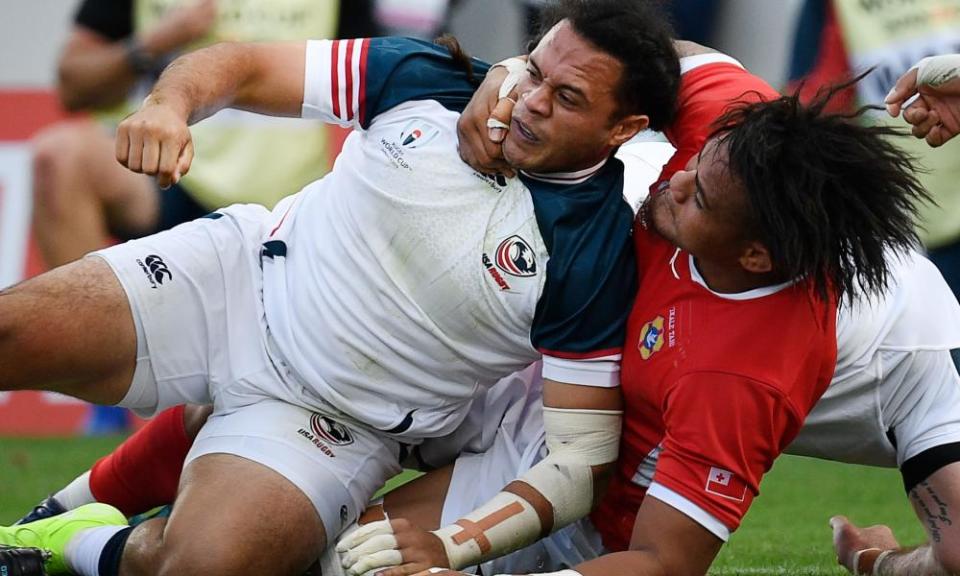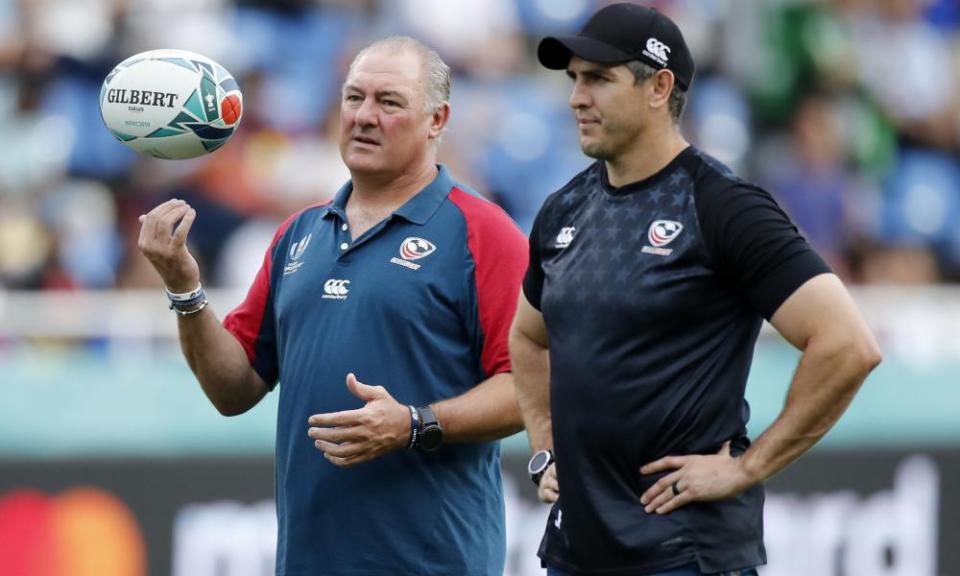Rise of MLR gives US rugby reason to be cheerful despite World Cup blank

Gary Gold is softly spoken at the best of times. In the worst of times on Sunday, he might’ve struggled to sound convincing when he said he was “unbelievably excited” about the future of American rugby.
Related: Japan show world their defiance and skill in face of typhoon destruction | Andy Bull
The South African coach’s Eagles went into the World Cup on a high but they had just been brought low 31-19 by Tonga in Hanazono, completing a campaign of played four, lost four and no match points gained.
Nonetheless, Gold told reporters he was “unbelievably excited about the future, particularly with the Major League Rugby competition that has now started. It has had a significant effect on the environment around our team.”
And therein lay the rub. The Eagles had a horrible draw in Japan. They lost to England (45-7), France (33-9) and Argentina (47-17) before a short turnaround to a physical tonking by the Tongans.
By the most obvious measures, the campaign was not a success. Against England, the Eagles had a man sent off. Against everyone, chances were missed, line-outs were lost, the defence could not hold, things fell apart. But as Gold noted, the US could be legitimately frustrated. They could and should have been closer to the bigger teams. The professionalisation of the US domestic game, though in its very early stages, has improved the national team. And if MLR can thrive, things will surely get better.
Look at Japan. Its Top League only began in 2003 and draws small crowds and yet here the Brave Blossoms are, hosts of a superb World Cup, delirious conquerors of Ireland and Scotland, preparing to face South Africa in a Tokyo quarter-final.
All we can really do is squeeze every ounce of learning out of this experience. Hopefully, that can catapult the team
Blaine Scully
“The one thing I’m tremendously happy about is the fight the guys have shown,” Gold said. “I don’t think anybody watching any of the games we’ve played can honestly turn around and say these players haven’t shown a huge amount of character. If you use that as a foundation to build a team on, you’ve got an opportunity to go places.”
Gold said he was “incredibly proud of this group of players. You can see how hard they work when they make a mistake and how hard they scramble. There was certainly no lack of effort. It’s a great learning curve.”
Like other senior players the captain, Blaine Scully, put in a mighty shift in Japan, scoring twice against Argentina.
At 31 and with 54 caps, after six seasons with Leicester and Cardiff, the Californian wing is without a professional team. He has refused to be drawn on or off the record on whether he’ll head for MLR but the league would benefit if he did.
“It’s pretty raw right now,” Scully said after Tonga, “but if it shows anything it’s just how bloody hard it is to win a game at the Rugby World Cup.
“We demonstrated that we’re a competitive team, but the margin is very small between being competitive and getting a result. We’re creating pressure, maintaining pressure deep out of our opposition half. Unfortunately, a turnover and then what feels like should be our score is then us under our sticks for the next 60 seconds.
“That’s the game of rugby, that’s life in the arena. All we can really do is squeeze every ounce of learning out of this experience. Hopefully, that can catapult the team for the next four years in the cycle.”
As founder of the US Rugby Players Association, Scully will be involved in that cycle on or off the field, starting “from a place where we now know as a group … just how hard it is and what it looks like to be at the top 1% of the game and the effort and the accuracy that’s needed to get results at Rugby World Cups.”

US rugby could do with Gold staying too, particularly if talk of a bid to host in 2027 or 2031 takes realistic shape. The former London Irish, Newcastle and South Africa coach oversaw strong results in 2018 and 2019, the two years of MLR so far, and took a hard core of MLR players with him to Japan. As the likes of Paul Lasike of Harlequins and Marcel Brache of the Western Force head back to far-flung lands, those based at home will prepare for MLR season three, which will take selected games to Vegas.
Related: Japan captain Michael Leitch says victory ‘was about more than just us’
Old Glory DC, the New England Free Jacks and Rugby ATL, based in Atlanta, will expand the competition to 12 teams in two conferences. Budgets are still small but San Diego Legion made headlines this week by signing the All Black World Cup winner Ma’a Nonu, a move to match Rugby United New York’s capture of Ben Foden of England and Matthieu Bastareaud of France. The double-champion Seattle Seawolves will be strong again, boosted by Canadians not employed by the Toronto Arrows.
Canada had an even rougher time in Japan, shipping 60-plus to New Zealand and South Africa and seeing Typhoon Hagibis cancel their game against Namibia. But many have spoken as glowingly of MLR’s importance to Canada’s future as locals in Kamaishi did of the squad’s help with the typhoon clean-up.
Gold could have been speaking for his counterpart, Kingsley Jones, when he said the Americans’ World Cup experience had been “tremendous, absolutely off the charts”.
“The Japanese are amazing people,” he said. “The work and effort that’s gone into hosting this competition is testament to Japan as a country. It’s been a great experience for all of us, for the players and the coaches.”
Despite his team’s results, perhaps with an unconscious nod to American rugby’s future, he added: “I can’t say enough good things about Japan.”

